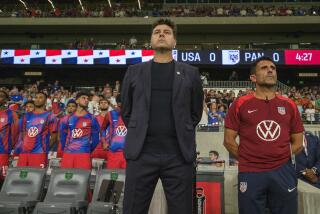U.S. Soccer Team Makes Strong Showing : It Places Third in World Five-a-Side Indoor Championships
The U.S. national soccer team has always had the want-to, but up to now it’s lacked the how-to in major international events. But that could be changing thanks to some recent success.
Since 1930, the United States has never advanced out of the first round of any major FIFA (Federation Internationale de Football Assn.) tournament. That was until two weeks ago when it finished third in the inaugural World Five-A-Side Indoor Championships.
Up against the major European and South American powers, the United States breezed into the semifinals with a 5-0-1 record before losing, 2-1, to host country the Netherlands and then ending up with a 3-2 victory over Belgium.
Despite not going up against each country’s very best, the United States seems to have been installed with a self-assuredness heading into the final round of regional qualifying this spring for the 1990 World Cup.
“I think one of the most important things is that the team, with all the outdoor players, gained a lot of confidence against teams with a lot more tradition--Italy, Belgium, Argentina, Paraguay, Brazil,” said Brent Goulet, a striker on both the U.S. indoor and outdoor national teams. “And for us to go out there and beat those teams going into the qualifying, surely it will carry over.”
Two of five remaining teams from the CONCACAF region (Confederation of North, Central American and Caribbean Federations) will qualify for the World Cup, which will be played in Italy in the summer of 1990. The United States begins its final round of qualifying on April 16 against Costa Rica.
It also will play El Salvador, Guatemala and Trididad & Tobago in a home-and-home series to determine the two qualifiers.
“One of the major things (from the five-a-side tourney) is that we learned how to win,” said goalkeeper A.J. Lachowecki, who plays for the Los Angeles Lazers but is not a member of the outdoor team. “We gained a lot of confidence and we certainly learned the things you have to do to keep your mind on the game.”
“It instilled a winning attitude, how to play in a big game,” outdoor and indoor starting midfielder Eric Eichmann said. “We know how to win. We learned how to win over there. We developed a winning attitude.”
Canada was the only nation other than the United States in the 16-team championship that used outdoor National team players. Belgium and Denmark were the only teams to use first-division players while the everybody else used amateurs or other lesser players.
But that only slightly dampened the sense of accomplishment for the United States, which after an opening 1-1 tie with Australia, thrashed Zimbabwe, 5-1, and Italy, 4-1, in the first round. Then, as the only non-European, non-South American team to advance into the second round, the United States stunned Argentina, struggled past Paraguay, 2-0, and beat eventual tournament champion Brazil, 5-3.
“When you look at the teams that participated, the people are going to be skeptical and say: ‘Well, they didn’t send their big-time players,” Goulet said. “But the great thing about it is that it is a world championship, and the United States has never done well in it before--no matter what it is.
“And for us to well in this, I think it will raise the interest in the world of soccer as to how far we’ve progressed.”
No fewer than nine outdoor U.S. National team members made the trip to Holland Jan. 5-15.
And while indoor and outdoor soccer are worlds apart, the United States has also been heartened by its outdoor play, including recent World Cup qualifying and Olympic performances, where it tied host South Korea (0-0) and defending World Cup champion Argentina (1-1) and lost respectably to the eventual gold medalist, the Soviet Union (4-2).
It has raised the respectability of the United States, while maybe not tremendously, at least measurably.
“Concrete examples are when you go to dinner and people smile and say ‘Hello,’ and the press comes to interview you and they say positive things,” said U.S. five-a-side coach John Kowalski, a naturalized Polish native. “But the biggest example is when you step onto the field and you sense the fear of the other teams and during the game you see them run back.”
The United States surely is not a feared World Cup contender, and the team is aware of it.
“For respect, I still think there is a long way to go with that,” Goulet said. “That was an indoor championship, it’s not the outdoor game and if anything I would have to say (any respect gained) was marginal.”
But marginal respect combined with incalculable confidence finally may get the United States into a World Cup for the first time in 40 years.






